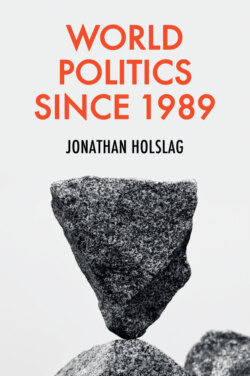Читать книгу World Politics since 1989 - Jonathan Holslag - Страница 12
THE PENDULUM
ОглавлениеWALLPECKERS, THEY WERE CALLED. IN THE WINTER OF 1989, hundreds of wallpeckers or Mauerspechte descended on the Berlin Wall. Armed with hammers and chisels, they attacked the imposing barrier of concrete and barbed wire. One year later, the entire Iron Curtain between the Soviet Union and the West came down. It was an electric moment. “A second heart implanted,” wrote a student in her diary, “can’t breathe any more.”1 From then onwards, the world experienced a period of opening up, of fading political fault lines, diminishing travel restrictions, and lowering barriers against trade. This was the age of globalization, of growing connectivity, commerce, and prosperity, growth that came with the expectation that the remaining vestiges of authoritarianism would make place for freedom.
The high tide of globalization appeared to hold opportunities for all.2 Emerging powers like South Korea, China, and Vietnam received access to the technology, capital, and consumer markets of rich societies, like the United States, Western Europe, and Japan. Rich citizens benefited from cheap goods, from toys to mobile phones, and specialized into services. Countries in Africa, Latin America, and the Middle East profited from growing raw material exports and investment. Trade propelled specialization between nations and specialization brought more growth to all. It was called a great convergence.3 There were still threats, to be sure. But these threats were expected to make countries work together. Terrorism, for example, pirates that targeted global shipping, criminals that penetrated digital networks – or pandemics. Experts spoke of security interdependence, of global common goods requiring a common policy.4 A teenager asked to name the most urgent challenge facing the world would likely mention pollution or climate change.
If there was competition, it would be a peaceful contest for connectivity, conducted by multinationals and start-up companies instead of states and soldiers. Container ships not aircraft carriers shaped the fortune of the major powers. Cheap airlines made city trips affordable. Internet traffic exploded. Global economic production grew. Extreme poverty retreated. Magazines wrote about a renaissance in Africa.5 “China’s arrival has improved Africa’s infrastructure and boosted its manufacturing sector,” a magazine trumpeted. “Africa’s enthusiasm for technology is boosting growth.”6 India with its hundreds of millions of paupers was set to shine. Globalization augured a golden era – or at least an exit from an era of iron.
